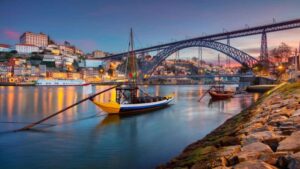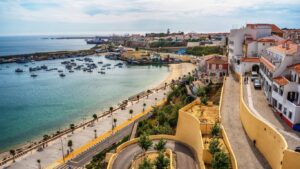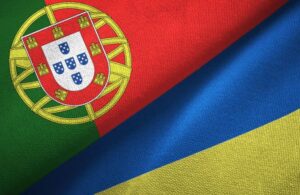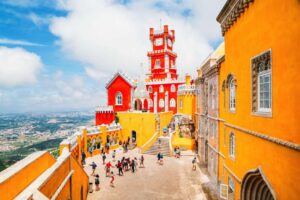
Following a meeting with Portuguese Prime Minister Luís Montenegro, Ukrainian Prime Minister Yulia Svyrydenko announced the country’s first contribution to the Energy Support Fund for Ukraine in the amount of EUR600,000.
“During the meeting, the Prime Minister of Portugal announced the first contribution to the Energy Support Fund for Ukraine in the amount of EUR600,000. We highly appreciate this step by our partners,” the Telegram message said.
The parties also discussed Portugal’s defense support for Ukraine, in particular through the PURL and SAFE mechanisms, as well as the Build in Ukraine and Build with Ukraine initiatives, which have significant potential for developing cooperation, particularly in the field of joint drone production.
In the context of preparations for the next Conference on the Reconstruction of Ukraine, the parties agreed to work on the conclusion of an intergovernmental agreement (G2G) to promote the involvement of Portuguese business and investment in the Ukrainian market.
“I also emphasized to the Prime Minister that Ukraine is grateful to the leaders of the European Union for their decision to provide Ukraine with EUR 90 billion in funding over two years — this is incredibly important assistance for Ukraine,” the Prime Minister stressed.

Portugal officially collects and publishes statistics on real estate transactions involving foreign buyers, but the publicly available data is usually aggregated by group (Portuguese buyers, EU residents, non-residents/non-EU), without a detailed breakdown by nationality. Detailed rankings of buyer countries are usually provided by specialized analytical companies and media based on real estate network databases.
According to data from the Portuguese National Statistics Institute (INE), in 2023, foreigners accounted for about 7.6% of all home purchases in the country, but provided approximately 13% of the total value of transactions. At the same time, buyers from non-EU countries pay an average of around €405,000 per property, while foreigners from the EU pay around €277,000, and the average market price is around €200,000.
In some regions, the proportion of foreigners is much higher. In the Algarve, they account for about 27% of all transactions and up to 38% of the total sales value, with 4 out of 5 properties there being purchased by non-residents. In cities, primarily Lisbon and Porto, the share of foreign transactions is smaller, at around 4-6%, but it is in the capital that the most expensive purchases are concentrated.
Private analysts provide a detailed picture by nationality. In Lisbon, according to Confidencial Imobiliário, 4,750 apartments and houses worth €2.22 billion were sold in the Urban Rehabilitation Area in 2023, of which 1,580 properties (about a third) were bought by foreigners. Buyers from North America led the way (approximately 16% of all “foreign” transactions), followed by the French (13%) and the British (9%). Chinese, Brazilian, and German investors also had a significant presence.
In the Algarve, according to estimates by Engel & Völkers, British buyers predominate, but there is also an active presence of citizens from Germany, France, Sweden, Switzerland, and the Netherlands; interest from Americans is growing noticeably.
Based on this data and market reviews, we can identify a conditional “top 10” of the most active foreign buyers of Portuguese real estate (by number of transactions and total investment volume):
Investors under the previous “golden visa” scheme (primarily from China, Brazil, Turkey, the US, and South Africa) are listed separately, but following the reform of the program, their share is gradually being redistributed in favor of “regular” transactions.
Thus, Portugal publishes official data on the share and prices of transactions with foreigners, but a detailed map by nationality is based mainly on research by specialized agencies and market analysts. Taken together, they show that demand is primarily driven by investors from Western Europe, North America, and Brazil, while the role of buyers from Eastern Europe and the CIS remains niche.

The average cost of housing in Portugal reached historic highs in 2025 amid sustained demand and limited supply, and analysts expect prices to continue to rise in 2026 despite tight affordability conditions.
According to data from the Portuguese Statistical Office (INE), in October 2025, the median bank valuation of residential real estate exceeded the threshold of €2,000 per square meter for the first time, reaching approximately €2,025 per square meter, which is 17.7% more than a year earlier. This marks more than a year of double-digit annual growth in housing prices.
The apartment segment is rising in price faster than villas: according to Global Property Guide estimates, the median bank valuation of apartments reached €2,345 per square meter (+22.1% year-on-year), while villas reached €1,472 per square meter (+11.8%). The highest prices are recorded in the Greater Lisbon agglomeration and in the Algarve tourist region.
According to the Idealista portal, by November 2025, the median asking price for residential real estate across the country reached around €3,000 per square meter (+7.8% year-on-year). At the same time:
Lisbon remains the most expensive market, with an average price of €5,914 per square meter (+4% over the year).
In Porto, the average price is around €3,908 per square meter (+5.9% over the year).
Inland regions (the center, part of Alentejo) are significantly cheaper – in many municipalities, prices range from €1,400 to €1,700 per square meter, while the most affordable districts in the country, according to local research, offer housing from €800 to €900 per square meter.
At the end of 2024, the INE housing price index (HPI) rose by 9.1%, with existing housing rising by 9.7% and new housing by 7.5%. In real terms (adjusted for inflation), prices have been rising continuously since 2013 and have increased by more than 80% during this period, which is significantly higher than the dynamics in neighboring Spain.
The market remains extremely active. In the first half of 2025, 84,247 residential properties were sold in Portugal, 20% more than in the same period in 2024. Sales of secondary housing amounted to 67,578 properties (+20.6% year-on-year), and new housing – 16,669 (+17.7%).
95% of transactions were made by buyers with tax residency in Portugal (about 80,000 properties, +21.9% year-on-year). Foreigners (both from the EU and third countries) purchased 4,205 properties, which is 7.2% less than a year earlier. Experts attribute the decline in the share of foreigners to reforms: the abolition of “golden visas” for real estate investments and the termination of the Non-Habitual Resident preferential tax regime from 2024, which reduced fiscal incentives for foreign investors.
At the same time, 2024 saw a record volume of transactions: in the third quarter of 2024 alone, €9.05 billion worth of housing was sold (+28% year-on-year), with 93.5% of buyers being Portuguese residents and the share of foreigners at around 6.5%.
Supply remains a bottleneck in the market. In the first half of 2025, 13,244 new homes were completed in the country, only 4.9% more than a year earlier and significantly below the rate of increase in the number of transactions. At the same time, the number of building permits issued is growing rapidly: in the first six months of 2025, 21,057 new housing units were licensed (+28.8% year-on-year), reflecting the growing confidence of developers and the expected acceleration in the introduction of new housing in the coming years.
According to BPI Research estimates, the growth in housing prices in Portugal is likely to continue in 2026. This is indicated by a stable labor market, record employment, and real wage growth, which support household purchasing power, as well as the stabilization of interest rates in the eurozone at “neutral” levels after a period of sharp tightening. Analysts expect that, given the current set of factors, prices in 2026 will grow at a rate above the European average, although probably slower than the double-digit figures of 2024-2025 (we are talking about high single-digit percentage growth, provided there are no new shocks in the eurozone). This will sustain investor interest but keep pressure on housing affordability for the local population, especially in large cities and on the coast.

Over the past seven years, the number of foreign citizens legally residing in Portugal has increased almost fourfold. According to Agência para a Integração, Migrações e Asilo (AIMA), by the end of 2024, there were about 1,543,697 foreign residents registered in the country, while in 2017, this figure was about 421,802 people.
Foreign citizens now account for approximately 15% of Portugal‘s population, confirming the accelerated growth of migration in this country.
According to AIMA, the majority of foreign residents are citizens of Brazil (approximately 31.4%), India (approximately 7.4%), Angola (approximately 6.9%), and Ukraine (approximately 5.9%). Most migrants are of working age: 77% are between 18 and 44 years old, and 56.1% are men. However, no direct official breakdown by nationality has been found in open sources — these data require additional verification.
Portugal is considered one of the most immigrant-friendly countries in the EU — it has a Golden Visa program that requires an investment of €250,000 and grants the right to a residence permit and then citizenship. There are other categories as well: the D2 business visa, visas for digital nomads, and financially independent individuals.
Meanwhile, the sharp increase in the number of applications is putting a strain on AIMA: the agency reports a shortage of staff, a significant backlog of unprocessed cases, and delays in processing applications. A number of media outlets report that some cases have been pending for over two years.
The growth in the number of foreign residents in Portugal reflects a changing demographic landscape and makes the country attractive to international investors, start-ups, and migrant workers.
Key factors include relatively low investment thresholds, openness to foreign specialists, and a favorable climate. However, this dynamic is accompanied by growing challenges: increased pressure on the housing market, social infrastructure, and a migration management system in need of modernization.
For businesses, this is a signal that Portugal is a promising market for relocation and the creation of international teams, but it is important to take into account bureaucratic delays and changes in migration policy.

The Portugal Golden Visa (ARI) program, launched in 2012, was initially based on real estate investments, but after reforms, it is now more focused on funds, donations, and capital investments.
Key parameters and changes.
1) In 2023, real estate was excluded as the main route for the program, forcing investors to switch to funds, business projects, or donations.
2) The minimum investment in a fund is €500,000.
3) In 2024, a record 4,987 golden visas (main applications + dependents) were issued, which is 72% more than a year earlier.
4) Since the program began, more than 15,619 visas have been issued to investors and about 22,000 visas to family members (as of September 2024).
China remains the largest country of origin for investors, but interest from the US, Brazil, Turkey, and other countries has increased. Changes to the program have prompted investors to diversify their investments, favoring funds and non-interest-bearing methods.
Source: http://relocation.com.ua/portugal-golden-visa-program-program-features-from-relocation/

Despite the temporary occupation of part of the agricultural land by the enemy, Ukraine demonstrated good results in the agricultural sector in 2024 and was able to return the historical ways of agricultural exports, and therefore offers the Portuguese Republic to strengthen cooperation, said Vitalii Koval, Minister of Agrarian Policy and Food, at an online meeting with José Manuel Fernandes, Minister of Agriculture and Fisheries of Portugal.
“In 2024, 57% of Ukraine’s agricultural exports went to the EU countries. In total, Ukraine exported agricultural products worth $24.6 billion, including $211.6 million to Portugal,” the Ministry of Agrarian Policy’s press service quoted the minister as saying.
In addition, he emphasized that last year Ukraine returned to its historical ways of agricultural exports, as 86% of agricultural products are exported through Odesa and Danube ports. According to him, Ukraine is actively working to open new markets, particularly in Africa and the Middle East.
Koval urged his Portuguese counterpart to work together to combat the illegal sale of Ukrainian grain to Russia.
The Minister also thanked the people of Portugal for their consistent support of Ukraine and the President’s humanitarian initiative Grain From Ukraine.